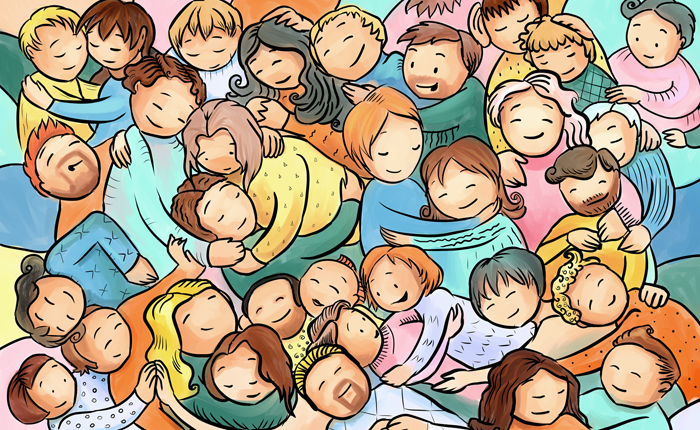Thirty years ago, with international adoption information thought to be nonexistent and U.S. birth records sealed, few parents expected that their children would ever meet their birth families. Today, as more and more adoptees reach adulthood, they are finding birth relatives—or are being found by them. Whether a child is from the U.S., Guatemala, Russia, or China, she may one day be in touch with her first family. These stories, each detailing an unexpected family reunion, may well reflect the complexity of what is ahead.
Ambivalent Connections
How did you feel when your birth mother found you?
Ambivalent. It has been almost six years since I met my birth mother, and I am still trying to negotiate a relationship with this woman who had been searching for me since the day she said goodbye, some 26 years ago. My heart is pounding as I write this. All the world will know what an ungrateful daughter I am for choosing these words.
I never wanted to search, and I surely never expected to be found by anyone. I never thought I had lost anything, much less anyone. I’ve felt connected to my adoption story only since everything happened—after living in Korea with 52 orphans for a year, after missing my family in America, after the phone call from a private detective, and after being introduced to my Korean mother and her family.
I was 24 years old. I didn’t want to meet her, but I was told (falsely) that she was dying, that it was her last wish to see me. How could I say no? If my parents had paused for one more second before encouraging me to meet her, the meeting would never have occurred. I wanted to do the right thing, and I wanted to make this woman, about whom I had completely forgotten, happy.
I now know where I was born, what time, my correct birthday. I have a beginning like everyone else. On the other hand, the adventure of contemplating such a search is gone, and I have had to give up what I believed my “reality” to be: the orphanage had changed my name and my birth father had burned all my papers and pictures. There is no proof of my existence in Korea.
I keep retracing the day we met. I recall most vividly the awkward, silent glances. I didn’t want to stare; I couldn’t help wanting to. At first, we thought we had it all wrong. I was not her daughter, nor she my birth mother. When we realized it was true, tears began to flow. I remember writing in my journal, “Now my life is complete, the final piece in its place.” But the truth? I still felt nothing. Only that it was nice to see what I will be—my hands, my feet, my ears, my face.
I met my birth mother’s family. But I felt like a fraud—this was not my world. I was merely on display. These people had held onto someone who no longer existed, and in her place was a grown woman who was not even Korean anymore.
Now what?
In the second year after we met, at the time of my birthday, when I didn’t get a card from Korea, I realized how unhappy I really was with this reunion. She forgot me again. Why would she search for me and not establish a relationship? It was my mother, the one who has always been here, who gave me the only answer that made sense. She made me see how painful this must be for my Korean mother, that perhaps all she wanted was to know that I was alive and well.
So now I must grieve the loss of my birth mother and birth country. I am angry about certain things, but I’ve come out confirmed in my American upbringing, yet comfortable with my Korean face. Would I have searched for my birth mother? I am not sure. —Joy Kim Lieberthal
A Piece of Identity
Three months ago, I received a stunning call in the middle of the night. It was from a man who said he was my biological brother. He had found me through the Korean Web site, Humanfind, a non-profit group whose purpose is to reunite Korean adoptees or families displaced by the Korean War. I never imagined that my birth family would find me this way.
Like most Korean adoptees, I grew up in a white family and white community. Unlike others, I was adopted with my identical twin sister, Marylinn. As I grew up, my only sense of history or belonging was as a member of my American adoptive family. As I became an adult, I started to think more about race and identity.
For years I considered searching, but I was afraid of what I’d find and of alienating my adoptive family. It wasn’t until I was 34 that I made an effort, and then only when my sister and mother went to Korea and talked me into joining them. To me, a successful search did not involve a reunion with my birth family. Instead, it was about finding answers to my questions about the past. So when the adoption agency in Korea told me that a fire had destroyed all of my adoption files, I was crushed.
The Surprise
Then, back in the U.S., I received that call. Suddenly I went from having only two pieces of paper to the possibility of acquiring an entire birth family, including a brother. I began to worry when this man who claimed to be my brother told me that he lived only four hours away. When he showed up at my home, however, with his wife and three young daughters, I set aside my fears. I learned that our birth mother had died 36 years ago, just a few months after giving birth to my sister and me.
Our father had been unable to care for us. He placed us in a baby home, intending to reunite with us when he remarried. Later, when he returned, he discovered that we had been adopted. When my siblings became adults, my father asked them to find us.
My brother treated our reunion as the happy conclusion of a 10-year search. But I wasn’t able to let go of the uncertainty. It seemed too good to be true. I needed scientific proof.
Reunion
My father decided to visit my twin sister and me immediately. When he saw us for the first time, he cried and held us tightly. Because my father couldn’t speak English nor we Korean, it was awkward. As my half-sister translated, my father spoke thoughtfully, as if his words weighed heavily on him. The first thing he said was “I love you.” Then came his apology, regret, and explanation for what had happened 36 years ago. It was bittersweet.
He brought piles of gifts. He gave my sister and me the wedding rings he and our birth mother had exchanged. But the most precious gifts were photographs of our mother and of us as babies, along with copies of the family registry documenting our birth. It was a piece of history I could finally hold.
Later that week, we got the results of a DNA test taken our first day together. It was true. I really was reunited with my birth family! I was incredulous and happy. All I had hoped for was a little information, maybe even the answer to the persistent “why”? Instead, I know now that I wasn’t abandoned, but had been missed and lovingly searched for. Do I feel more complete and happy? No, not really. Are all my questions answered? No. But although everything is not perfect, I am content. I know I am one of the lucky ones. —Marylee Munson Oddo
Existing in the Shadows
Out of pure ignorance, most people perceive an adoption reunion as black or white; either you meet your birth family or you don’t. Either you have that “Oprah moment” of recognition and elation, or you forever live life estranged from your origins. What most people don’t realize is that, for many adoptees, there is a huge gray area between those polarities. For those of us who remain a secret to our extended birth family, this is a hard place to be.
My experience with my Korean mother is best characterized as an illicit love affair, involving a go-between, conducted during three brief meetings in Seoul in October 1999. All traces of my existence had to remain absolutely hidden from my mother’s husband and her family. My translator would call her on her personal mobile phone, requesting a visit. If she was alone, she furtively arranged a meeting during her shopping time, when she wouldn’t be missed by her husband and adolescent children. We met clandestinely for a few stolen hours in a caf far from her apartment.
Our surreptitious meetings were like a black hole, outside of daily life. Generous with information about my first five years with her, my mother always “forgot” to bring photos of her new husband and my half-siblings, and speaking of them guardedly, as if her legitimate married life was something to which I had no claim.
I know enough about the terrible constraints under which Korean women live to understand my mother’s painful situation. An only daughter with domineering older brothers, she told me matter-of-factly that if her husband or her brothers discovered my existence, she would be beaten and cast out for bringing shame to their families. No one in Korea, except the officials who handled my adoption, knew about her disastrous affair with my birth father, a married man whom she has desperately tried to forget. He never fulfilled his promise to leave his wife when I was born, and after two years of barely surviving his violent and abusive visits, she ran away with me to begin anew. After three more years struggling as a single mother, she relinquished me, hoping she was sending me to a better life.
With this as a backdrop, it’s not anger that I feel as much as a nagging sense of incompleteness, feelings that would be recognized by adoptees whether or not they’ve reunited with their birth families. Where do I begin with the questions? What should I feel for someone who both claims and denies me? How much of her am I entitled to? My only option is to accept this relationship on her terms if I am to have any relationship with her at all.
Perhaps I am falling into the “good adoptee” trap of gratitude and politeness, yet I do feel lucky to have met my biological kin, aware that there are many other adoptees who will never have that chance. This gratitude compels me to be the polite child, respecting my birth mother’s privacy and the delicate balance upon which her life after me hangs. Yet I find it difficult to bridge the divided terrain between illegitimacy and recognition. She gave me her address but mentioned she would refer to me as her American “pen pal” should anyone find my letters or photos. More than the linguistic impediments, perhaps this denial of my existence has kept me from contacting her in the two years since our reunion.
Like many adoptees who participate in search and reunion, I’m slowly gaining an elusive sense of wholeness, created from filling in the biological blanks and the genetic roots. Yet, however ready I may be to move on with my life, I am forced to live in an imposed limbo. To be a secret child is to be at cross-purposes with the birth parent: against my urge to bring my story to light stands my birth mother’s seal of silence over her shadowy past. I have my mother’s telephone number, but I dare not call her. I see her face, but it is from a photograph from long-ago, unreachable in the living, breathing here and now. —j.m.w. lives in the east coast.



